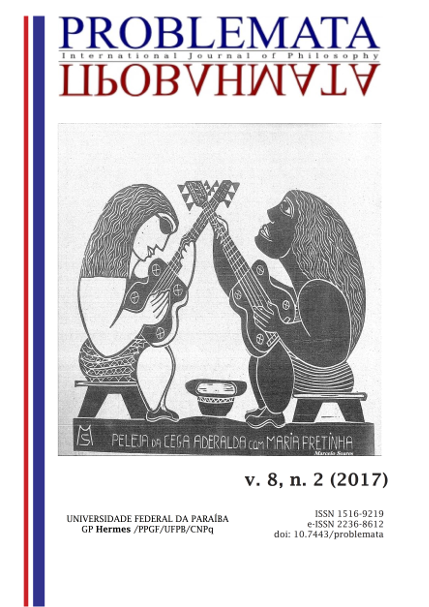ROUSSEAU: POVO SOBERANO E LIVRE
DOI:
https://doi.org/10.7443/problemata.v8i2.32171Abstract
Rousseau nunca aceitou a sociedade do seu tempo, e um dos motivos é precisamente o fato dela ser, pelo menos para ele, uma sociedade sem liberdade e sem a igualdade entre seus membros, pois seu fundamento encontra-se alicerçado em um pacto de submissão e não de associação. Para Rousseau, portanto, é necessário pensar uma nova sociedade formada através de um verdadeiro pacto que preserve a liberdade dos seus associados. O objetivo deste artigo é apresentar, analisar e discutir essa nova sociedade como imaginada por Rousseau.Downloads
References
BADIOU, Alain. Compêndio de metapolítica. Trad. Felipe Duarte. Lisboa: Instituto Piaget, 1999.
BERLIN, Isaiah. La liberte et ses traîtres: six ennemis de la liberté. Trad. Laurent Folliot, Paris: Payot & Rivages, 2007.
CASSIRER, Ernst. A filosofía do iluminismo. Trad. Álvaro Cabral. Campinas: UNICAMP, 1992.
COLETTI, Luciana. Sociedade e política: estudo sobre natureza humana em Jean-Jacques Rousseau. Passo fundo: IFIBE, 2006.
CRANSTON, Maurice. Rousseau’s theory of liberty. In: WOKLER, Robert (Ed.). Rousseau and liberty, Manchester: Manchester University Press, Manchester,
DELANEY, James. Starting with Rousseau. London: Continnum, 2009.
DENT, Nicholas. Rousseau. London: Routledge, 2005.
DERATHÉ, Robert. Rousseau e a ciência política de seu tempo. Trad. Natália Maruyama. São Paulo: Barcarolla; Discurso Editorial, 2009.
FRIEDLANDER, Eli. J.J. Rousseau: an afterlife of words. Cambridge: Harvard University Press, 2004.
HARRISON, Ross. Democracy. London: Routledge, 1993.
HOFFMAN, Stanley. The social contract, or the mirage of the general will. In: Christie MCDONALD, Christie & HOFFMAN, Stanley (Eds.). Rousseau and Freedom. Cambridge: Cambridge University Press, 2010.
MELZER, Arthur. The natural goodness of man: on the system of Rousseua’s thought. Chicago: University of Chicago Press, 1990.
PUTTERMAN, Ethan. Rousseau: law and the sovereignty of the people. Cambridge: Cambridge University Press, 2010.
ROUSSEAU, Jean-Jacques. Do contrato social. Trad. Lourdes Santos Machado. São Paulo: Abril Cultural, 1983 (Os Pensadores).
______. Confissões. Trad. Fernando Lopes Graça. Lisboa: Portugália, 1964.
______. Emílio ou da educação. Trad. Sérgio Milliet. Rio de Janeiro: Bertrand Brasil, 1995.
______. Cartas escritas da montanha. Trad. Maria Constança Peres Pissarra e Maria das Graças de Souza. São Paulo: EDUC; UNESP, 2006.
______. Fragmentos político. Trad. José Rubio Carracedo. Contraste. Revista Internacional de Filosofia. Málaga, v. XI p.233-252, 2006ª.
SAHD, Luiz Felipe Neto de Andrade e Silva. Rousseau e as máximas do governo do estado. Florianópolis: Nefipo, 2010.
SHELL, Susan. Emile: nature and the education of Sophie. In: RILEY, Patrick (Ed.). The Cambridge companion to Rousseau. New York: Cambridge University Press, 2001.
SIMPSON, Matthew. Rousseau's Theory of Freedom. London: Continuum, 2006.
WOKLER, Robert. Rousseau: a very short introduction. New York: Oxford University Press, 2001.
Downloads
Published
Issue
Section
License
Authors who publish with this journal agree to the following terms:
- Authors retain copyright and grant the journal right of first publication with the work simultaneously licensed under a Creative Commons Attribution License that allows others to share the work with an acknowledgement of the work's authorship and initial publication in this journal.
- Authors are able to enter into separate, additional contractual arrangements for the non-exclusive distribution of the journal's published version of the work (e.g., post it to an institutional repository or publish it in a book), with an acknowledgement of its initial publication in this journal.
-
- Authors are permitted and encouraged to post their work online (e.g., in institutional repositories or on their website) prior to and during the submission process, as it can lead to productive exchanges, as well as earlier and greater citation of published work (See The Effect of Open Access).





